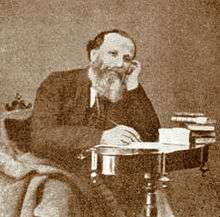Francesco Dall'Ongaro
| Francesco Dall'Ongaro | |
|---|---|
 | |
| Born |
Francesco Dall'Ongaro (1808-1873) |
| Nationality | Italian |
| Occupation | Writer, Poet, Dramatist |
Francesco Dall'Ongaro Italian: [franˈt͡ʃesko dalˈloŋgaro][1] (1808–1873) was an Italian writer, poet and dramatist.
Biography
Born in Mansuè, on 19 June 1808, Dall'Ongaro was educated for the priesthood, but abandoned his orders, and taking to political journalism founded the Favilla at Trieste in the Liberal interest.[2]
In 1848, he enlisted under Garibaldi, and next year was a member of the assembly which proclaimed the republic in Rome, being given by Mazzini the direction of the Monitor officiate.[2]
On the downfall of the republic, he fled to Switzerland, then to Belgium and later to France, taking a prominent part in revolutionary journalism; it was not until 1860 that he returned to Italy, where he was appointed professor of dramatic literature at Florence. He corresponded with Alexandre Dumas and Niccolo Tommaseo. Subsequently he was transferred to Naples, where he died on 10 January 1873.[2]
His patriotic poems, Stornelli, composed in early life, had a great popular success; and he produced a number of plays, notably Fornaretto, Bianca Cappello, Fasma and Il Tesoro. Some opf his work was translated into English by Theodosia Trollope.[3] His collected Fantasie drammatiche e liriche were published in his lifetime.[2] In 1863 Francesco Dall'Ongaro presented his Italian drama, The Resurrection of Prince Marko.
References
- ↑ See entry ungaro in the Dizionario d'ortografia e di pronunzia.
- 1 2 3 4
 One or more of the preceding sentences incorporates text from a publication now in the public domain: Chisholm, Hugh, ed. (1911). "Dall' Ongaro, Francesco". Encyclopædia Britannica. 7 (11th ed.). Cambridge University Press. p. 772.
One or more of the preceding sentences incorporates text from a publication now in the public domain: Chisholm, Hugh, ed. (1911). "Dall' Ongaro, Francesco". Encyclopædia Britannica. 7 (11th ed.). Cambridge University Press. p. 772. - ↑ Richardson, Sara (2013). The Political Worlds of Women:Gender and Politics in Nineteenth Century Britain. Routeledge. pp. 178, 252. ISBN 1135964939. Retrieved October 29, 2014.
External links
| Wikiquote has quotations related to: Francesco Dall'Ongaro |